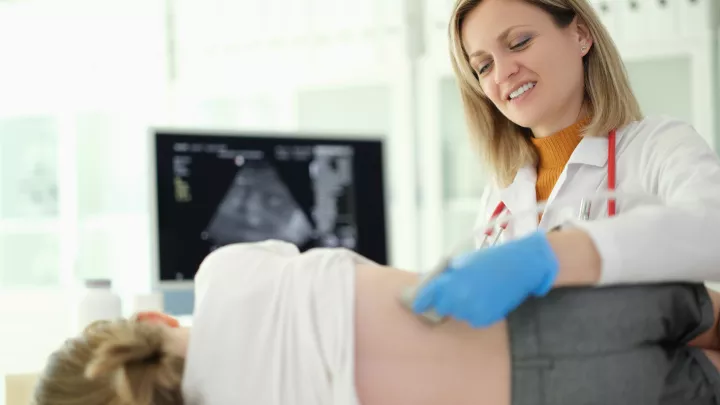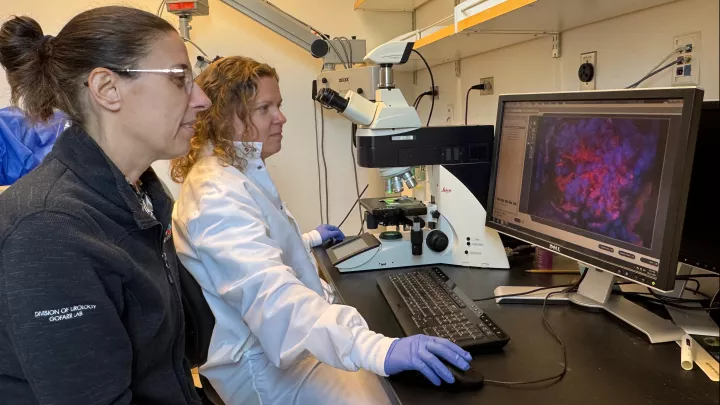Research Topics
- Regenerative medicine and tissue engineering research using stem cells for neo-organ regeneration and cell therapeutics
- Kidney replacement and novel stem cell treatments for various causes of renal failure
- Laboratory for organ regenerative research and cell therapeutics in Urology
Research Overview
Roger De Filippo, MD and Laura Perin, PhD, principal investigators and co-directors of the GOFARR Laboratory for Organ Regenerative Research and Cell Therapeutics in Urology, focus on the development of new stem cell therapeutics and other techniques for organ regeneration.
Using a model for Alport’s Syndrome, a kidney disease characterized by progressive renal fibrosis, the research team injected Amniotic Fluid Stem Cells (AFSC) early in the course of the disease and found that the treatment increased survival time and ameliorated the decline in kidney function.
Kidneys are responsible for filtering toxins from the blood. Chronic kidney disease (CKD) affects millions of children and adults in the United States. Characterized by a progressive decline in kidney function, CKD leads to an increase in health problems, including heart disease and diabetes. Those who develop end-stage kidney disease depend on dialysis to clear the waste from their blood and, ultimately, most patients require a kidney transplant in order to survive. With such stark long-term consequences, this novel research offers hope to those suffering from the disease and is also a significant advancement in the stem cell research field.
Stem cell therapies have emerged over the last twenty years as a promising new area of biomedical research. While embryonic stem cells remain a controversial subject, AFSC are found in the fluid surrounding a fetus. The cells can be collected via amniocentesis or at birth without any harmful effects. The lab’s research demonstrates that the therapeutic benefit of AFSC is similar to that of embryonic stem cells.
Current projects include kidney organ repair techniques with stem cells, as well as, new stem cell therapy studies for lung, heart, diabetes and kidney diseases. The goal is to search for potential applications that could be used to prevent these diseases and significantly delay the damage they cause.
In the News: Press Releases
- Regenerative medicine and developmental biology hold promise for patients with damaged organs - Imagine Spring 2014
- Researchers use collaboration and combined experience to further regenerative biomedicine - Research Highlights Spring 2012
Publications
- A novel source of cultured podocytes. Da Sacco S, Lemley KV, Sedrakyan S, Zanusso I, Petrosyan A, Peti-Peterdi J, Burford J, De Filippo RE, Perin L.
- PLoS One. 2013 Dec 12;8(12):e81812. doi: 10.1371/journal.pone.0081812. eCollection 2013.
- Amniotic fluid stem cells prevent β-cell injury. Villani V, Milanesi A, Sedrakyan S, Da Sacco S, Angelow S, Conconi MT, Di Liddo R, De Filippo R, Perin L.
- Cytotherapy. 2014 Jan;16(1):41-55. doi: 10.1016/j.jcyt.2013.08.010. Epub 2013 Nov 7.
- Autologous cell seeded biodegradable scaffold for augmentation cystoplasty: phase II study in children and adolescents with spina bifida. Joseph DB, Borer JG, De Filippo RE, Hodges SJ, McLorie GA.
- Journal of Urology. 2014 May;191(5):1389-95. doi: 10.1016/j.juro.2013.10.103. Epub 2013 Oct 29.
- A novel mutation of anti-Mullerian hormone gene in Persistent Mullerian Duct Syndrome presented with bilateral cryptorchidism: a case report. Wongprasert H, Somanunt S, De Filippo R, Picard JY, Pitukcheewanont P.
- Journal of Pediatric Urology. 2013 Aug;9(4):e147-9. doi: 10.1016/j.jpurol.2013.03.004. Epub 2013 Apr 20.
- Anorectal malformation and associated end-stage renal disease: management from newborn to adult life. Giuliani S, Midrio P, De Filippo RE, Vidal E, Castagnetti M, Zanon GF, Gamba PG.
- Journal of Pediatric Surgery. 2013 Mar;48(3):635-41. doi: 10.1016/j.jpedsurg.2012.10.073. Review.


